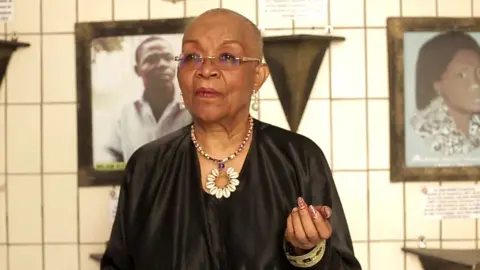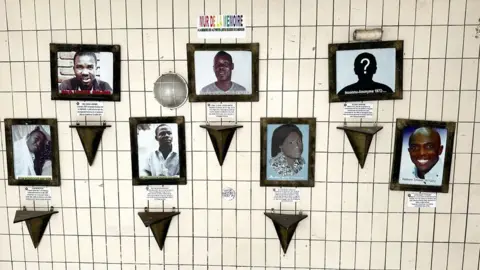 The BBC
The BBCDespite being defamed, threatened and publicly humiliated, veteran Cameroonian lawyer Alice Nkom is determined to defend the rights of gay people in her country.
The human rights organization she runs, Redhac, was recently suspended by the government and she is due to appear before investigators to answer allegations of money laundering and financing terrorist groups – which she denies.
The 80-year-old says authorities are obstructing her work and believes she is being targeted because of her legal advocacy for the LGBT community.
“I will always defend homosexuals because they risk their freedom every day and are thrown in jail like dogs,” she told the BBC in a firm tone, speaking in her office in the city of Douala.
“My job is to protect people. I don't see why I would say I'm protecting everyone but homosexuals.”
Clad in a black dress, Ms. Nkom delivers her stark message in a measured voice that reflects years of thought-out legal wrangling.
According to the country's penal code, both men and women found guilty of homosexual sex can be sentenced to up to five years in prison and pay a fine. Members of the LGBT community also face ostracism from their families and society at large.
As a result, Ms Nkom is seen as a surrogate parent for some in her country who have been open about their sexuality to their family.
The legal expert has children of her own, but hundreds, perhaps thousands, of others look to her as their advocate after her work for more than two decades defending those accused of homosexuality.
“She is like our father and our mother. She is the mother we find when our families have abandoned us,” says one LGBT activist, Sebastien, not his real name.
Committed to the Universal Declaration of Human Rights, which is incorporated into Cameroon's constitution, Ms. Nkom argued that freedom from discrimination based on sexual orientation should be seen as a fundamental right that supersedes the penal code.
“You shouldn't close down fundamental rights, you shouldn't suppress them – you should protect them,” she says.
It is a struggle that has put Mrs Nkom in a bind.

She says she has been physically threatened on the street several times and reveals that when she first started in this area of law, she hired bodyguards to protect her.
But her journey to becoming one of Cameroon's most outspoken legal figures began long before that.
In 1969, aged 24, she became the country's first black female lawyer after studying in France – the former colonial power – and Cameroon.
She says she was encouraged to continue studying by her then-boyfriend, who later became her husband.
Her previous legal work involved representing the less affluent and disadvantaged, but it was a chance meeting in 2003 that led her to become involved in the fight to decriminalize homosexuality.
She was at the prosecutor's office in Douala when she noticed a group of young men, handcuffed two at a time, who didn't have the courage to look up.
“When I checked the court records, I found out that they were being prosecuted for homosexuality,” she says.
“Homosexuality Attempt”
This offended her sense of human rights and she was very clear that sexual minorities should be included among those whose rights are protected by the constitution.
“I have decided to fight to ensure that this basic right to freedom is respected,” adds Ms Nkom.
She went on to found the Association for the Defense of Homosexuality (Adefho) in 2003.
Since then, she has been involved in dozens of cases. One of the most notable in recent years was her defense of transgender celebrity Shakiro and her friend Patricia in 2021.
The two were arrested while eating in a restaurant and then accused of “attempted homosexuality”.
They were sentenced to five years in prison for violating the penal code and violating public decency.
“It's a hammer blow. This is the maximum period specified in the law. The message is clear: homosexuals have no place in Cameroon,” Ms Nkom was quoted as saying at the time.
Shakiro, along with Patricia, were later released pending appeal and have since fled the country.
Since then, the situation of LGBT people has not improved. LGBT activist Sebastien, who runs a charity to help families with gay children, believes things have gotten worse recently.
Last year, a song based on the popular mbolé rhythm was released with a title and lyrics that encouraged people to target and kill homosexuals. It is still widely shared and played regularly in the trendiest venues in the country's major cities.
“People attack us because of this song that glorifies crime,” says Sebastien.
LGBT people are supposed to hide their sexual identity, but “some people set traps to approach us and attack us or report us to the police,” he says.
 Brenda Bia/Instagram
Brenda Bia/InstagramMs Nkom says when Brenda Biya, the daughter of President Paul Biya, came out publicly to say she was a lesbian last year, she thought changing the law might help.
Mrs. Biya, who spends most of her time outside Cameroon, was cited that she hopes her openness can make a difference at home.
Ms Nkom senses an opportunity. “I'm using the Brenda case as a precedent. Now I have a case where I can challenge the president,” she says.
The lawyer also asked Ms. Biya to do more for the cause of the LGBT community in Cameroon.
“Brenda still hasn't responded to me since I made the statement to the media, but I know she will.”
For now, however, she will continue her legal work.
She sees the latest attempt to curtail her efforts as yet another obstacle—certainly not enough make her stop the fight she has been waging since 2003.
You may also be interested in:
 Getty Images/BBC
Getty Images/BBC
